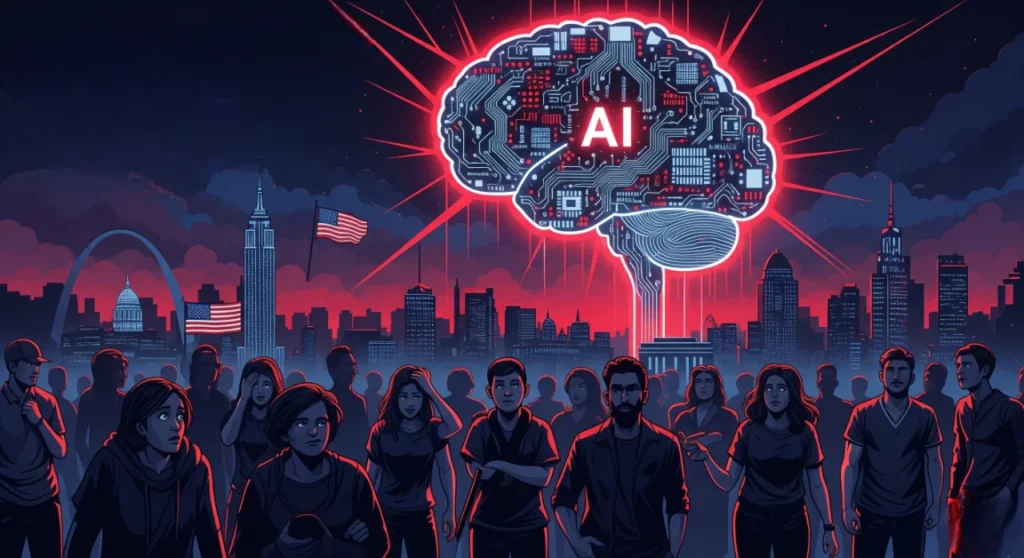Artificial intelligence is everywhere, but Americans aren’t celebrating.
A new report highlights deep anxiety about AI’s impact on jobs, trust, and the future — with fear now outweighing excitement across the country.
Key Takeaways
- Americans fear AI will replace jobs more than it will create them.
- Both Republicans and Democrats want stronger AI rules.
- U.S. citizens show the lowest global trust in AI regulation.
- Most prefer human-made content over AI-generated alternatives.
- Long-term fear drives current nervousness about AI adoption.
Americans are more nervous than excited about AI, with concerns centered on job loss, lack of government trust, and preference for human-made content. A bipartisan majority now wants stronger regulation, reflecting deep-seated anxiety that AI could widen inequality and destabilize the workforce.
America’s Uneasy Relationship With AI
For years, artificial intelligence operated in the background — curating playlists, suggesting online purchases, and quietly shaping digital life. That era is over. Today, AI dominates headlines, political debates, and boardroom agendas. Yet despite its ubiquity, new data shows Americans are more fearful than enthusiastic about the technology.
Jobs at the Centre of Concern
Unsurprisingly, job security sits at the heart of public unease. While investors tout AI as a productivity revolution, ordinary Americans see risk. “When people imagine AI, they don’t think about smarter search engines — they think about losing their job,” said Clifford Young, president of Ipsos U.S. Public Affairs.
The fear is not unfounded: Goldman Sachs estimated in 2023 that generative AI could affect 300 million jobs worldwide. For Americans already wary of an economy seen as favoring elites, AI looks less like opportunity and more like disruption.
A Rare Point of Bipartisan Agreement
One striking finding: AI anxiety cuts across party lines. Both Democrats and Republicans want tougher rules, an unusual consensus in today’s polarized climate. Bernard Mendez, co-author of the report, noted: “Politicians have an opening. Whoever speaks credibly to AI fears could reap enormous political rewards.”
This bipartisan demand could accelerate federal proposals for AI oversight, though Washington has historically lagged on tech regulation.
Distrust Runs Deep
Americans are also uniquely skeptical that their government will regulate AI responsibly. A Pew Research Center survey found only 32% of U.S. adults trust Washington to do the right thing most of the time. That distrust extends to AI — with fears the system will once again tilt toward corporate interests.
This sentiment stands in contrast to Europe, where governments are actively shaping AI rules with the EU AI Act.
Humans Still Beat Machines — For Now
Despite rapid advances, most Americans prefer human-made content. Whether it’s journalism, art, or entertainment, audiences remain wary of synthetic output. A 2024 Axios/Ipsos poll showed 58% of respondents distrust AI-generated news.
Anecdotally, 29-year-old freelancer Emily K. from Ohio told us: “If I know an article is AI-written, I’ll skip it. It feels like I’m being tricked.”
Fear Outpaces Excitement
The bottom line: Americans are more nervous than thrilled. While Silicon Valley frames AI as innovation, the public sees risk — existential or economic. This mismatch is shaping both consumer adoption and political discourse.
Why It Matters
Americans already feel shortchanged by a system that benefits the wealthy. Add a disruptive, labor-replacing technology like AI, and distrust deepens. That public perception could slow adoption, reshape elections, and create regulatory battles that determine the pace of innovation.
Reader Impact
For everyday readers, this means AI won’t just change tech headlines — it could affect your job prospects, the trustworthiness of your news feed, and the products you rely on. Understanding public skepticism helps you anticipate how fast (or slow) AI enters your daily life.
Numbers to Watch
- 300M jobs worldwide at risk from AI automation.
- 32% of U.S. adults trust government most of the time.
- 58% distrust AI-generated news.
What’s Next
- Expect politicians to leverage AI anxiety in 2024–25 campaigns.
- Federal agencies may face pressure for stricter AI oversight.
- Companies will need to prove how AI benefits workers, not just profits.
- Public trust could become a decisive factor in AI adoption.
Conclusion
Americans’ relationship with AI is marked by unease, not excitement. Jobs, trust, and fairness dominate the conversation, suggesting adoption will remain cautious unless clear benefits emerge. For businesses and politicians alike, the question is no longer if AI will reshape America — but whether America is ready to embrace it.
Source: Ipsos
